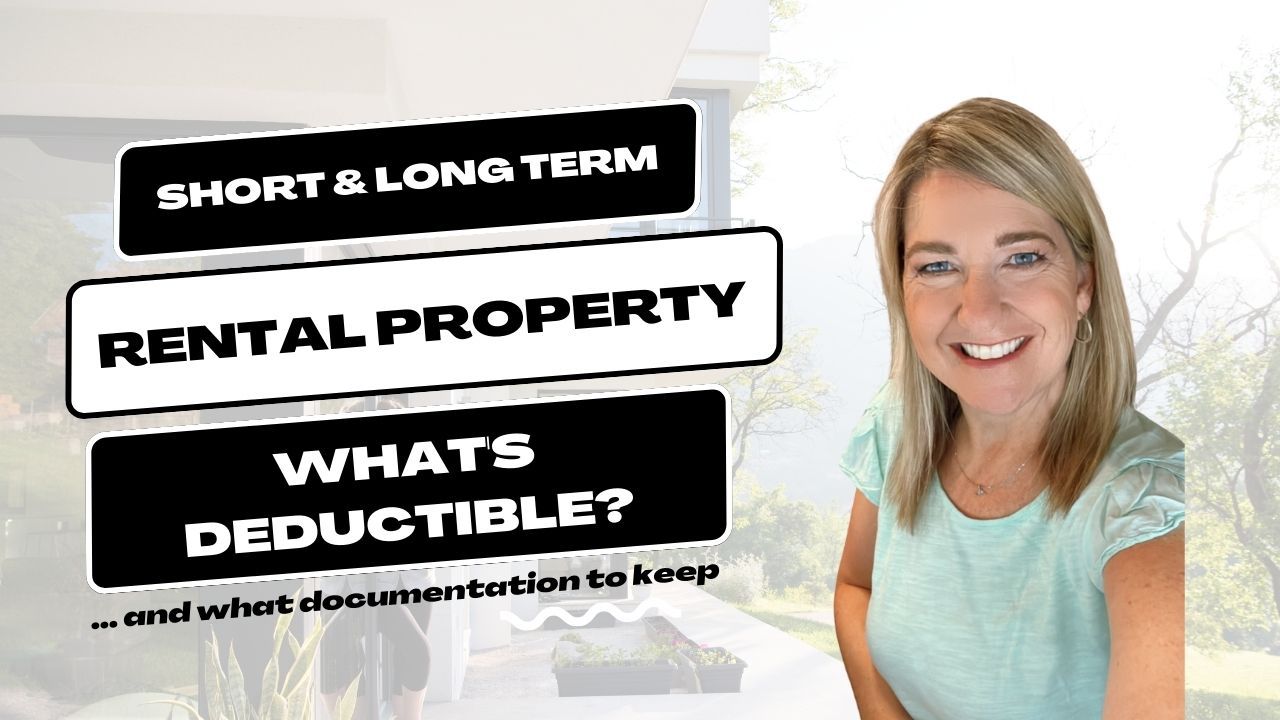
Renting a part of your home out or buying a new home to rent? Airbnb, VRBO, Direct Rentals?
If you are new to the rental space, it's worth noting that it's not all easy money...and not all properties have the same net returns. With the additional money coming in, there will be money going out!
Planning for the money going out and keeping track of those costs can seem daunting, but is key to your success and decision-making.
What do you need to track and what can you deduct in your Rental Property?
Short Term Rentals (STRs) and Long Term Rentals (LTRs) have different time commitments and return on investments, but both have similar expenses and record keeping.
They also have similar tax filing strategies, although STRs may qualify to be deducted in a different way on your tax return.
Both need solid record-keeping.
Why is recordkeeping important?
>>> Owning a rental property provides many tax deduction opportunities. But you can only deduct what you know and have records of!
>>> Is your rental property making money? Should you rent it long-term, short-term, sell?
Your numbers are your decision-makers. You can only make profit-driven decisions, if you know and understand your numbers.
So, what should you keep track of?
We've created a checklist of the top and most common deductions and expenses for landlords renting real estate properties either as Long-Term Rentals or as Short-Term Rentals direct to tenants or on platforms such as AirBnb, VRBO, Furnished Finders... or even your own website.
Rental Property Deductions
Below are some examples of tax deductions and items to track.
| Accounting | Advertising | Bank Fees |
| Cleaning | Food for guests | Furniture and decor* |
| Gardening | HOA fees | Home Warranty |
| Insurance | Internet | Legal and Professional |
| Licenses and Permits | Painting | Pest Control |
| Platform Fees | Prop Mgmt Fees | Repairs |
| Security | Subscriptions | Supplies |
| Taxes | Travel | Utilities |
* In general, you can expense items < $2500, but depreciate items > $2,500.
Don't forget to track your TOTAL investment, what you owe, and your gross income.
>>> To download our complete free checklist, click here.
Key Dates to Note
Below are key dates to note. These are dates you need to know when you file your taxes.
- Date of purchase, transfer of deed
- Date property is READY to RENT
- Days rented
- Date of sale or exchange
Expenses incurred to get your property "Ready to Rent" are not immediately deductible but instead capitalized and depreciated over time, in which the depreciation is deductible.
We will not get into cost segregation here, but the idea behind it is that different kinds of capitalized costs or components of your property can be depreciated over different time periods thus giving you a more accelerated deduction.
For example, you may be depreciating your home over 27.5 years, but your appliances won't last that long. So if you have them broken out separately, you can depreciate them faster.
Documents To Keep
While we recommend keeping tax returns and supporting documents for 7 years, we recommend you keep your real estate documents forever!
And whenever possible, electronically! Have you tried reading that paper receipt from 2 years ago? The ink is gone!
Here is a quick list of documents that you need to keep!
- Closing Statement on Purchase of Home
- Closing Statement on Sale of Home
- 1031x Documents
- Cost Segregation Study
- Appraisals
- Deed
- Warranties
- Receipts
- Lease Agreements and Contracts
- Tax Filings and Tax Payments
Property Photos and Videos
Whether you are browsing videos of your property for before and after photos, for nostalgia, documenting your inventory and fixtures, or as part of legal proceedings or claims... take photos!
Apps are made to make it easy
Developers have created applications to make complicated things easy. So find the apps you like best and use them!
Using apps like STESSA or Apartments.com can assist you in tracking your rental properties and even can automate your rent collection.
If you have a large number of rentals, you may look at other property management apps specialized for managing many properties.
For accounting, we recommend QuickBooks Online or WaveApps for tracking your income, expenses, and investment and even for storing receipts.
If you would like help setting up your QuickBooks Online or WaveApps accounting software for your rental properties, send us an email to [email protected]. We are here to help!
New California County tax filing and business asset tax for STRs
If you are managing a short-term rental property in California, keep an eye out for a new STR tax form sent by your county that can assess 1.0-1.2% of taxes towards you furnishings and assets within the rental property. To read more about this and see an example, visit our blog post "California now taxing the ASSETS of Short Term Rental Businesses"




